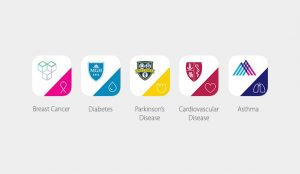Apples highly anticipated Spring Forward event suggested a miraculous presentation of the Apple Watch. Beyond a sleekly designed smartwatch that will hopefully legitimize wearables (in spite of it needing to charge every 18 hours), Apple also launched ResearchKit. ResearchKit facilitates the sharing of medical data from iPhone users with healthcare professionals for use in clinical trials. It supports the Health Data Exploration Projects conclusion that users of personalized health technology are receptive to sharing their health data with academic researchers for analysis.

Five mobile applications were announced with ResearchKit, with a focus on breast cancer, diabetes, Parkinsons disease, cardiovascular disease, and asthma. The majority of these conditions are modifiable by altering underlying risk factors, including unhealthy eating and physical inactivity. One of these applications, developed by Stanford University School of Medicine, is MHeart Counts. It measures users daily activity and exercise level to measure heart health, and enrolled 11,000 users in a 24-hour timeframe. Alan Yeung, Medical Director of Stanford Cardiovascular Health, noted that one year and the cooperation of 50 medical centers across the country are normally required to identify 11,000 research participants. ResearchKit will also sync with HealthKit, which the Vitality Institute reported on last year.
Following Apples announcement, discussions turned to ethical, legal, and social challenges. How will users share their information? Will all users be required to share their data? How will Apple ensure data privacy? Apple subsequently noted that data will be shared with researchers on an opt-in basis. To proactively target these overarching concerns, the Vitality Institute is working with the Institute of Medicine (IOM) to host a workshop on the Ethical, Legal, and Social Implications of Personalized Health Technology. We are looking for interested stakeholders to work with us to develop, pilot, and implement a set of responsibility guidelines for personalized health technology.
The Apple Watch and ResearchKit will be released by Apple in April 2015, just before the Swatch Group releases watches with wireless connectivity in May. They indicate they do not have plans to develop the fully featured smartwatch like those crafted by Apple. Time to watch this space!
Have you enrolled in Apples ResearchKit? Would you? Are you interested in sharing your health information for research purposes? We would love to hear from you! Tweet at the Vitality Institute @VitalityInst or Gillian Christie @gchristie34
Source of thumbnail: http://i-cdn.phonearena.com/images/articles/174055-image/Apple-ResearchKit-announcement.jpg





